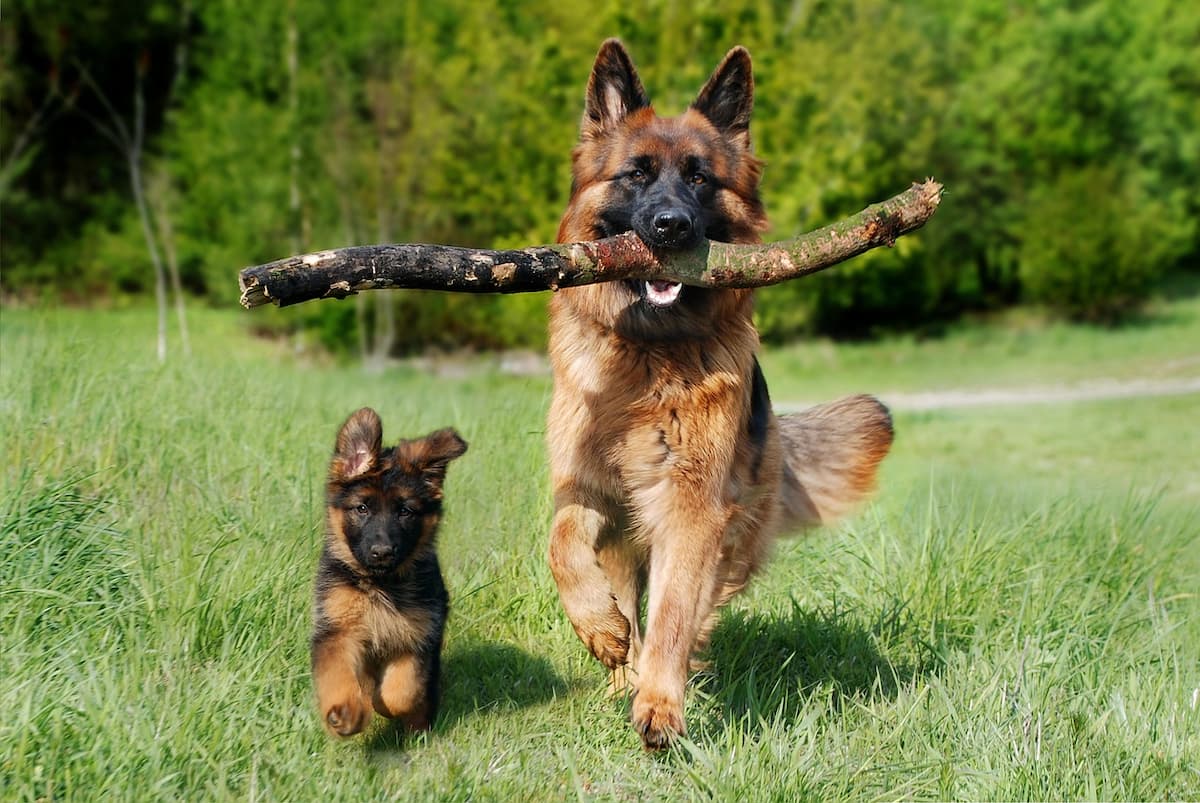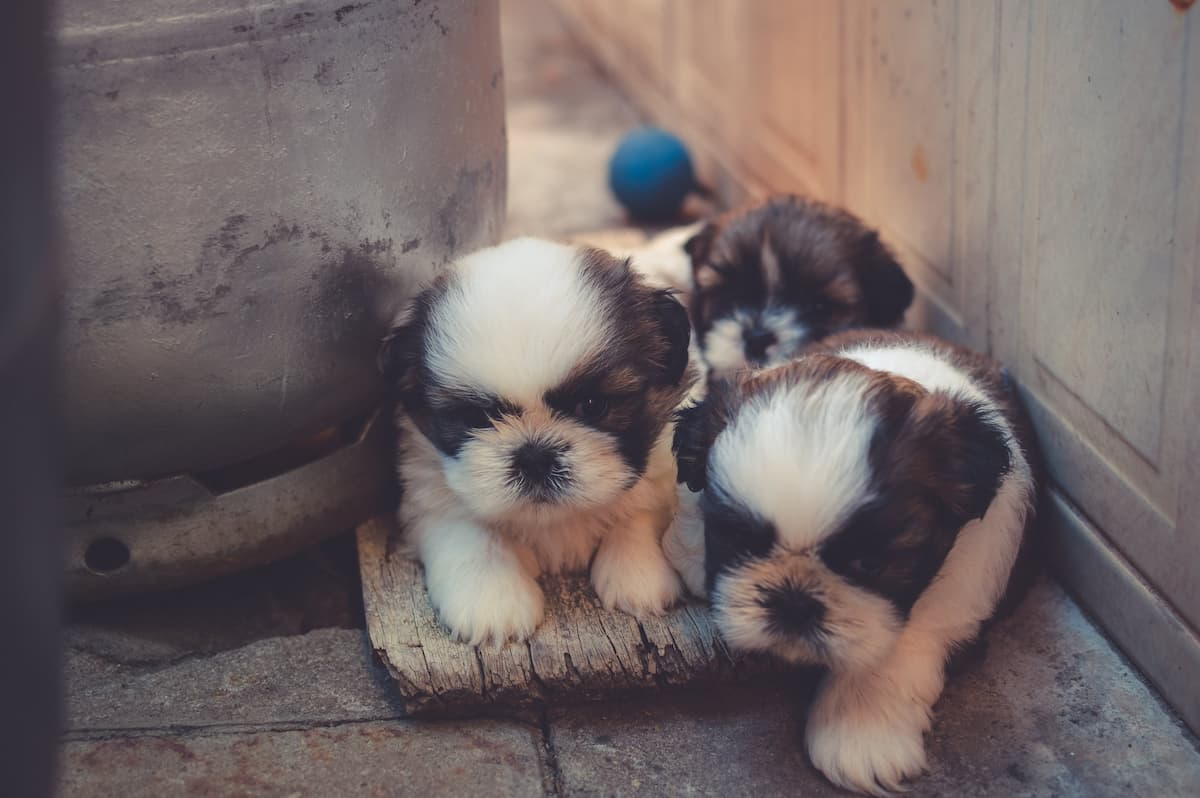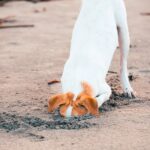There is nothing more heartwarming than watching your dog become a mother.
But what happens when the new mother dog starts eating her litter?
This is a nightmare that no dog owner wants to go through.
Read on to find out what makes a dog eat its own young.
Why do Dogs Eat Their Young?
Turns out, dogs aren’t always the cuddly, lovable beings we picture them to be.
One perplexing and often disturbing behavior exhibited by some mother dogs is their tendency to devour their own offspring.
As shocking as it may seem, understanding the instinctual behavior behind why dogs eat their young can provide us with valuable insights into their natural instincts and the complex dynamics of their social structure.
Dogs have come a long way from their wild ancestors, but remnants of their instinctual behavior still exist.
In the wild, the survival of the pack is of utmost importance, and sometimes, a dog mother makes the heartbreaking decision to eat her puppies if she deems them weak, sick, or a potential threat to the pack’s survival.
This unsettling act may seem brutal to us, but in nature, it can be seen as a way for the mother dog to ensure that her strongest and healthiest offspring have the best chance of survival.
Maternal stress is believed to be another crucial trigger for cannibalism in dogs.
When a mother dog feels stressed, whether due to external factors or internal discomfort, she may experience feelings of anxiety and restlessness.
This increased stress can affect her bonding with her puppies, leading to a lack of maternal instinct.
Additionally, stress can disrupt the mother’s ability to communicate effectively with her litter, further complicating the nurturing process.
As a result, the mother may fail to recognize her puppies as her own and treat them as prey.
Hormonal changes also contribute to the occurrence of cannibalism in dogs.
During pregnancy and the postpartum period, a mother dog undergoes significant hormonal fluctuations.
These hormonal changes are necessary for the proper development and nurturing of the puppies.
However, if the hormonal balance is disrupted, it can impair the mother’s natural instincts, resulting in abnormal behaviors like cannibalism.
Imbalances in hormones such as oxytocin, often referred to as the “love hormone,” can impact the mother’s ability to bond and care for her young.
Understanding and Preventing Postpartum Aggression in Dogs
Welcoming a litter of adorable puppies into the world is an exciting and heartwarming experience.
However, it’s essential to remember that new mothers, including dogs, can sometimes display unexpected behavior.
One such behavior is the unfortunate phenomenon of postpartum aggression.
This term refers to a mother dog’s aggression towards her own puppies or other animals.
While it may be distressing to witness, understanding the reasons behind this behavior is crucial to prevent any harm and ensure the safety of both the mother and her pups.
Causes of Postpartum Aggression
– Hormonal Surge: After giving birth, dogs experience hormonal changes that can affect their behavior.
These hormonal surges can sometimes make the mother dog hyper-vigilant and overprotective, leading to aggression.
– Inadequate Socialization: Proper socialization plays a key role in a dog’s behavior.
If a mother dog hasn’t been adequately socialized with other animals or hasn’t had positive experiences with other puppies, she may exhibit aggression towards her own litter.
– Fear or Stress: Like humans, dogs can experience fear and stress.
These emotions can manifest as aggression towards their own puppies if they feel threatened or overwhelmed.
Preventing Postpartum Aggression
– Early Socialization: Exposure to other animals during their puppyhood can help mother dogs feel more at ease around their own puppies and reduce the chances of postpartum aggression.
– Provide a Safe Environment: Ensuring a calm and comfortable space for the mother dog and her puppies can help reduce stress levels.
This includes minimizing disturbances, noise, and excessive handling of the puppies in the early days.
– Seek Professional Help: If you notice signs of postpartum aggression, it’s important to consult a veterinarian or a professional dog trainer.
They can provide guidance and customized strategies to address the issue and create a safer environment for both the mother and her puppies.
Remember, postpartum aggression in dogs is a complex issue that requires understanding and patience.
Through early socialization, a safe environment, and professional guidance, you can help prevent this behavior and create a harmonious and loving environment for the mother dog and her precious puppies.
Recognizing Warning Signs and Seeking Professional Help when needed
It’s a heartbreaking and disturbing sight to witness a mother dog consuming her newborn puppies, but understanding the reasons behind this behavior can help us approach the situation compassionately and seek professional help when needed.
Dogs eating their young can be a result of various factors, and it’s crucial to recognize the warning signs early on to ensure the wellbeing of both the mother and her offspring.
Recognizing the Warning Signs
-
- Abnormal behavior: If a mother dog starts behaving aggressively towards her puppies or displays signs of distress, it could be an indication that she may resort to cannibalism.
-
- Inadequate maternal instinct: Some mother dogs may lack the necessary maternal instincts to care for their young, leading them to consume their puppies.
-
- Stress or illness: Dogs experiencing high levels of stress or suffering from certain illnesses may engage in this behavior as a response to their physical or emotional condition.
Seeking Professional Help
If you notice any of these warning signs or suspect that a mother dog is indeed eating her young, it’s essential to seek immediate professional help.
Veterinarians and animal behaviorists can evaluate the situation, determine the underlying causes, and provide the necessary interventions to ensure the safety and welfare of the mother and her puppies.
Remember, understanding the reasons behind this distressing behavior is the first step towards helping these animals.
By recognizing the warning signs and seeking professional help when needed, we can contribute to the overall wellbeing of dogs and prevent such tragic incidents.
FAQ
Q: So why would a dog, who is known for their loyalty and affection, resort to eating their own puppies?
A: Well, this behavior is not very common in domesticated dogs, but when it does occur, there are a few possible explanations.
Some experts believe that a dog may eat their young due to extreme stress or anxiety.
It can be driven by instinctual survival instincts gone awry.
Q: Can you give us some specific examples of situations that might trigger this behavior?
A: Certainly!
Imagine a mother dog feeling overwhelmed by a challenging environment, such as extreme overcrowding, excessive noise, or even a lack of resources like food and shelter.
These harsh circumstances could put immense pressure and stress on the mother, ultimately leading her to making desperate and sometimes tragic choices.
Q: Are there any other factors that could contribute to this behavior?
A: Absolutely!
Another factor could be health issues.
If a puppy is born with severe defects or illnesses, the mother dog might instinctively sense that the puppy is unlikely to survive.
In such cases, she might resort to eating the young as a way to avoid unnecessary suffering or to prevent potential predators from being attracted to the weak puppy’s scent.
Q: Is there anything that dog owners can do to prevent this behavior?
A: Preventing such behavior often starts with providing a safe and stress-free environment for the mother dog and her puppies.
Ensuring the mother has a comfortable and spacious area, free from potential dangers or disruptions, can go a long way.
Q: If a dog does eat her young, does it mean she will always display this behavior?
A: Not necessarily.
It’s essential to understand that each dog and situation is unique.
In some cases, it might be a singular, isolated incident.
However, if a dog consistently displays this behavior across multiple litters, it might be an indicator of underlying genetic or psychological issues.
In such cases, seeking professional advice from a veterinarian or animal behaviorist is crucial.
Q: Is there anything else we should know about dog eat her young?
A: Well, it’s important to remember that dogs are complex beings, and their behaviors can sometimes be influenced by a variety of environmental, genetic, and emotional factors.
While the act of a mother dog eating her own young is undoubtedly unsettling, it’s crucial not to jump to judgment.
Instead, let’s focus on understanding and providing support to ensure the overall well-being of our canine friends.
Reflecting on the Closing Chapter
While we may find the sight of a mother dog eating its own young disturbing, we must remember that dogs, like any other species, have their reasons.
In the animal kingdom, survival instincts reign supreme, and the bond between a mother dog and her puppies is no exception.
Nature has equipped dogs with a remarkable ability to assess the situation and make tough decisions to ensure their own and their offspring’s survival, even if it seems heart-wrenching to us.
When a mother dog resorts to eating her own pups, it is most often a reaction to extreme circumstances.
The reasons can vary from stress, illness, a lack of resources, or even genetic predispositions.
While this behavior may appear cruel to our human sensibilities, it is their unique way of making the best out of a challenging situation.
It is crucial to remember that domestication has altered dogs’ behaviors, and the majority of pet dogs would not exhibit such extreme actions.
Selective breeding over generations has favored traits that encourage nurturing behaviors towards their young ones, creating the loving companions we welcome into our homes today.
Nevertheless, it’s essential to be aware that even cherished pets may exhibit occasional oddities due to their primal instincts ever-present within them.
Understanding the complexities of why dogs eat their young is a reminder that the natural world is not always as idyllic as we envision it.
As dog owners and enthusiasts, it’s our responsibility to provide a safe and nurturing environment for our pets, ensuring they have all the necessities and support they require to flourish, preventing such distressing behaviors from surfacing.












